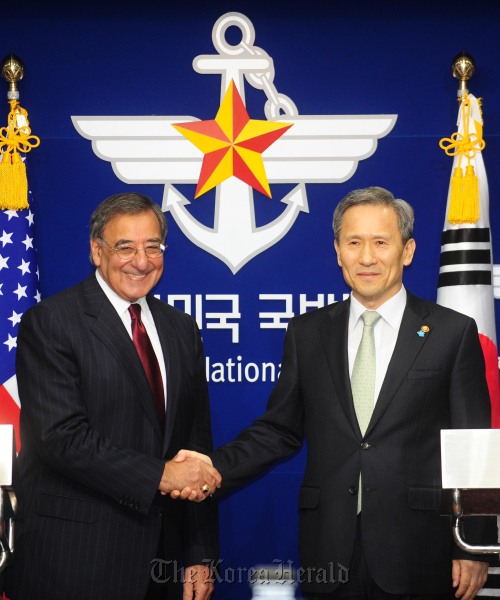South Korea and the U.S. agreed to establish a joint operational plan to counter North Korean provocations within this year and strengthen bilateral cooperation in dealing with cyberspace threats, the allies’ defense chiefs said Friday.
They also decided to craft a “tailored bilateral deterrence strategy” to bolster their capabilities to handle North Korea’s nuclear threats and those from its weapons of mass destruction.
These agreements were announced after South Korean Defense Minister Kim Kwan-jin and his U.S. counterpart Leon Panetta held the annual Security Consultative Meeting in Seoul.
During the talks, the U.S. defense secretary also pledged that Washington will maintain the current U.S. troop level on the Korean Peninsula, dismissing speculation that the U.S. may reduce its overseas troop strength as its defense budget faces substantial cuts.
The U.S. maintains 28,500 troops here mainly as deterrence against the belligerent state that killed 50 South Koreans in two attacks last year alone.
“Together, we will ensure a strong and effective alliance deterrence posture including the U.S.’ nuclear umbrella so that Pyongyang never misjudges our will and our capability to respond decisively to nuclear aggression,” Panetta said during a joint press conference.
 |
Korean Defense Minister Kim Kwan-jin (right) shakes hands with his U.S. counterpart Leon Panetta after the 43rd Security Consultative Meeting between the two allies at the ministry’s building in Seoul on Friday. (Joint Press Corps) |
“It is no secret that the U.S. faces some tough fiscal decisions back home. Let me reassure you and the Korean people that we are fully committed to sustaining and enhancing our military presence, capabilities and our activities in Asia and on the peninsula.”
Underscoring that the U.S. agreed to immediately provide an “overwhelming augmentation of its forces” during a crisis here, Kim said that the joint counter-provocation plan will serve to effectively deter North Korean provocations.
Kim also said that as the North has designated 2012 as the year of its becoming a “strong and prosperous state” and is stepping up efforts for the third-generation power succession, the possibility of additional provocations is “fairly high.”
“The combined counter-provocation plan is currently in its completion stages. With the plan, we will be able to come up with a timely, effective response in a situation that is not only an all-out war situation, but also when North Korea conducts additional local provocations as well,” Kim said.
“If North Korea conducts additional provocations, we will take an initial response in self defense, and this will be done with Korean assets to strongly respond to the provocations. Later on when time comes, there will be a joint response using the available assets (of the U.S.).”
In the joint communiqu (full text available at www.koreaherald.co.kr), two allies outlined their intentions to jointly tackle cyber threats. The allies plan to form a “strategic policy dialogue” on cyber security issues.
In recent years, North Korea has launched a series of cyber attacks that crippled a number of major South Korean government and business websites.
“This (the cyberspace threat) is a whole new arena, the threats we have to confront. You know what can be done using cyber to attack ... to threaten Korea. We know cyber is now a weapon of the future. For that reason, we want to take steps to make sure that we are dealing with that threat,” Panetta said.
During the SCM, the two defense chiefs also agreed to establish the “Korea-U.S. Integrated Defense Dialogue,” a senior level policy consultative channel that will be co-chaired by the deputy defense chiefs of the two allies.
Officials said that the dialogue will ensure “high-level political oversight and synchronization of the alliance objectives.”
The two sides also urged the North to “accept the practical value of, and abide by” the Northern Limit Line, a de facto inter-Korean maritime border the North has long disputed.
The North has insisted that the sea border should be redrawn further south as it was unilaterally set by the U.S.-led U.N. Command at the end of the 1950-53 Korean War.
“The NLL has been an effective means of separating ROK and North Korean military forces and preventing military tension for 58 years,” the statement said.
Stressing that North Korea’s nuclear activities pose a significant threat to the region and the world and are clearly in violation of the international rules, the two called on the North to stop their programs.
“North Korea continues to defy the international community as it enhances its nuclear weapons, its ballistic missile programs and continues to engage in dangerous and destabilizing proliferation activities,” Panetta said.
By Song Sang-ho (
sshluck@heraldcorp.com)







![[Today’s K-pop] Blackpink’s Jennie, Lisa invited to Coachella as solo acts](http://res.heraldm.com/phpwas/restmb_idxmake.php?idx=644&simg=/content/image/2024/11/21/20241121050099_0.jpg)
